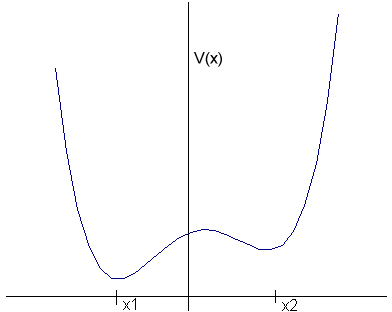If you have some physical system, whether it's simple like a pendulum, or complex like the universe, you would expect it to settle down into it's lowest energy state. For a pendulum the energy $V(x)$ is just proportional to $x^2$ so it's easy to see where the position of lowest energy is. However suppose we have a system with a more complicated potential like:

The position with the lowest energy is $x_1$, but note that there is a local minimum at the point $x_2$. The system could get trapped in this local minimum at $x = x_2$ and may not reach $x = x_1$. If this graph represented the energy of the universe $x_1$ would be the true vacuum, and the metastable state at $x_2$ would be a false vacuum.
The string landscape arises because the energy is a complicated function of lots of different variables. So as the universe is settling down after the big bang it's possible the universe may not settle down to the true vacuum, but may be caught in a local minimum like the point $x = x_2$ above. A local minimum is called a false vacuum, because it looks like the lowest energy state but only locally. If you could nudge the universe a bit you might be able to get it into a lower energy state, but again this may be a false vacuum not the lowest energy true vacuum. It might take a lot of nudging to get it into the true vacuum.
This matters for a couple of reasons. Firstly the false vacua will have different properties to the true vacuum. For example physical constants may be different. Also because of quantum tunneling the universe will eventually flip into the true vacuum, and that is likely to be a fatal experience for anyone living in the universe at that moment.
The multiverse idea can arise in many ways, but the current most popular is from eternal inflation. This proposes that the universe is undergoing continual inflation, but pockets of it stop inflating to form a local "universe", and this universe will settle into one of the many false vacua. Because there are many (possibly infinitely many) of the universes you'll get universes in lots of different false vacua and therefore with different physical constants. This is the "multiverse".
I've heard it said, though I don't know how widely this is accepted, that the true string vacumm is fully supersymmetric with none of the dimensions compactified, and we owe our existance to the fact that our bit of the universe is caught in a false vacuum. If this is true we had better hope our bit of the universe doesn't tunnel into the true vacuum any time soon.

